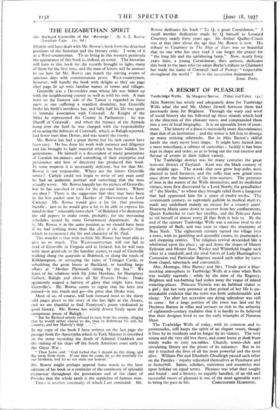Sir Richard Grenville of the • Revenge.' By A. L.
Rowse.
THE ELIZABETHAN SPIRIT
(Jonathan Cape. 12S. 6d:) • - - OTHERS will have dealt with Mr. Rowse's book from the detached positions of the historian and the literary critic. - I write of as a West-countryman. To us living in this western peninsula the appearance of this book is, indeed, an event. The historian will turn to this book for the records brought to light, many of them for the first time, and the man of letters will be anxious to see how far Mr. Rowse can match the stirring events of spacious days with commensurate prose. West-countrymen, however, will handle the book with delight as they see page
after page lit up with familiar names of towns and villages. Grenville was a Devonshire man whose life was linked up with the neighbouring county as well as with his omit. A man born on the Eastern side of the Tamar is regarded in these parts as one suffering a manifest disability, but Greniille broke his birth's invidious bar, and fully half his life was spent in intimate association with Cornwall. ' As Knight of the Shire he represented the County in Parliament ; he was Sheriff of Cornwall ; and when the menace of the Armada hung over the land he was charged with the responsibility of securing the defences of Cornwall, which, as Ralegh reported, had fewer men than Devon, and was nearer the enemy.
Mr. Rowse has had a great theme but his task cannot have been easy. He has done his work with patience and diligence and has brought to light material which has been hidden for
generations. He himself is a descendant of many generations of Cornish tin-miners, and something of their .enterprise and
persistence and love of discovery has produced this book. In some respects it is necessarily deficient, but for that Mr.
Rowse is not responsible. Where are the letters Grenville wrote ? Carlyle could not begin to write of any man until he had an authentic portrait and something that the man actually wrote. Mr. Rowse happily has the picture of Grenville, but he has searched in vain for the personal letters. Where are they ? There is the suggestion that they may have been in the lost packet sent by Hawker of Morwenstow to Lord Carteret. Mr. Rowse would give a lot for that precious
bundle ; just as he would give a lot to be able to express his mind to that ".miserable town clerk " of Bideford who destroyed, the old papers to make room, probably, for the increasing schedules issued by some. Government department. As it is, Mr. Rowse is in the same position as we should have been if we had nothing more than the Acts of the Apostles from
which to reconstruct the life and character of St. Paul.
The wonder is that with so little Mr. Rowse has been able to give us so much. The West-countryman will not fail to read of Grenville in Virginia and in Ireland, but he will turn with most gratitude to the familiar scenes, to read of Grenville
walking along the quayside at Bideford, or along the roads of. Kilkhampton, or surveying the ruins of Tintagel Castle, or
rebuilding the great house at Buckland, or handling large affairs at " Mother Plymouth sitting by the Sea." We learn of his relations with Sir John Hawkins, Sir Humphrey Gilbert, Ralegh and above all Sir Francis Drake. Drake
apparently reaped ,a ;harvest of glory that might have been Grenville's. Mi. Rowse seems to regret that his hero just
missed—it was touch and go—the prize that Drake won. Most of us, of course, will look forward most to the thirty add pages given to the story of the last fight at the Azores, and we are thankful to find _Tennyson's poem vindicated as good history. Mr. Roirse his wisely drawn freely upon the sumptuous prose of Ralegh :
" But Sir Richard utterly refused to turn from the enemy, alleging that he would rather choose-to die, than to dishonour his Self, his
country, and her Majesty's Shiri. . _ .
In my copy of the book- I have written on the last page the passage froth the Apocryirlia which in York Minster is inscribed on the stone recording the death of Admiral Craddock and the sinking of his ships off the South American coast early in
the Great War :
" Then Judas said : ' God forbid that I should do this thing, and flee away from them. If our time be come, let in die manfully for our brethren, and let us not stain our honour.' "
Mr. Rowse might perhaps append these words to the later editions of his book as a reminder of the continuity of splendid endeavour throughout the generations and of the claim of Pericles that the whole earth is the sepulchre of famous men.
There is another continuity of which I am reminded. Mr. Rowse dedicates his book p" To a great Cornishman." I
recall another dedication made by Q himself to Leonard Courtney nearly forty years ago. Sir Arthur Quiller-Couch was at that time about the age that Mr. Rowse is now. His tribute to Courtney in The Ship of Stars was so beautiful that no- one who has once read it can forget the prayer for " the long life and the unfaltering lamp." Now, nearly forty years later, a young Cornishman, then unborn, dedicates this book to the man who (to adopt Burke's tribute to Chatham) has made the name of Cornwall (and of Fowey) " respectable throughout the world." So is the succession maintained.
ISAAC FOOT.














































 Previous page
Previous page